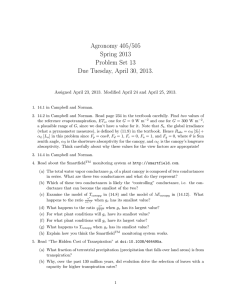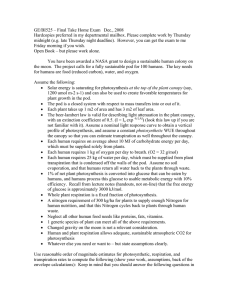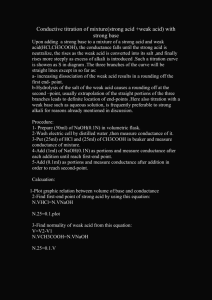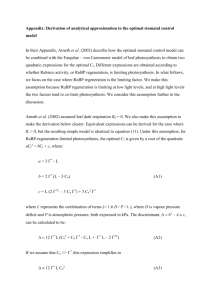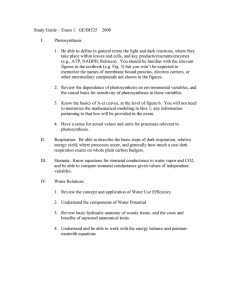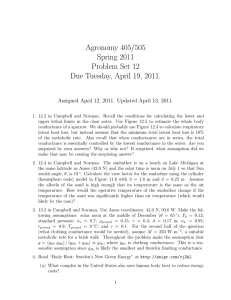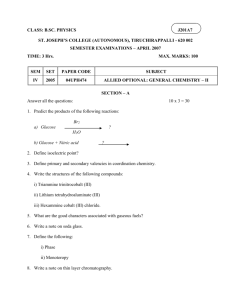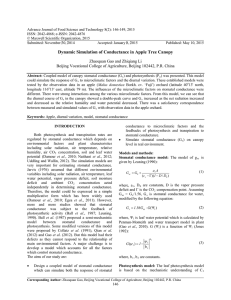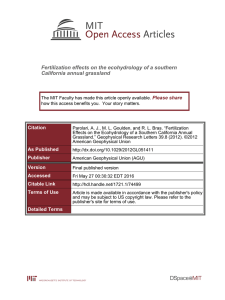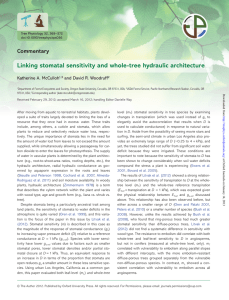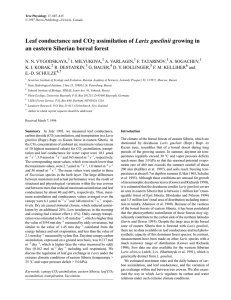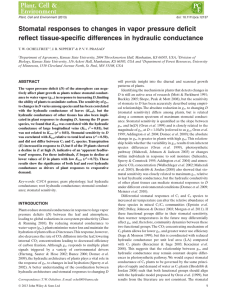Document 11827227
advertisement
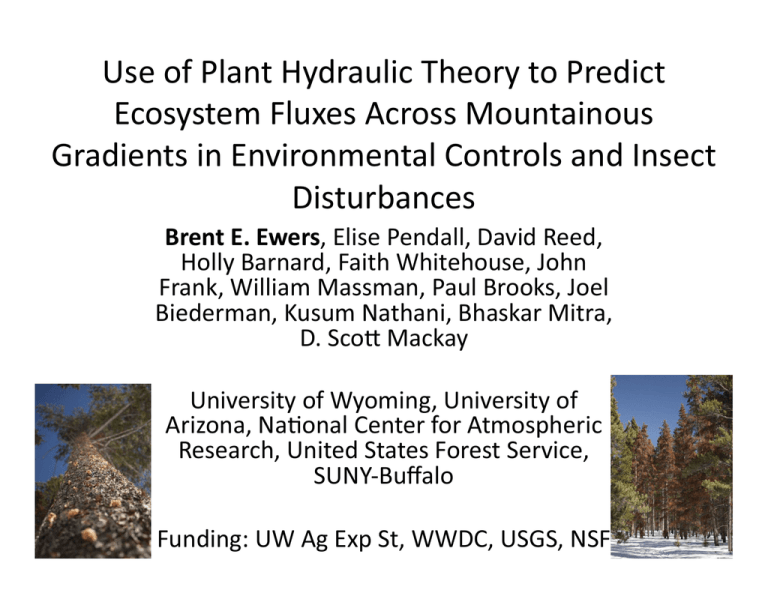
/+(*08.4(&%+.80+.&0
+/8/0)(47/.+//+4*0&*+4/
.&*0/&**5&.+*)*0(+*0.+(/*
*/0
&/04.*/
;(&/*((;5&;
+((8.*.;&0%%&0%+4/;+%*
.*';&((&)//)*;4(.++'/;+(
&.)*;4/4)0%*&;%/'.&0.;
>+3'8
*&5./&08+8+)&*$;*&5./&08+
.&9+*;1+*(*0.+.0)+/,%.&
/.%;*&000/+./0.5&;
D4 (+
4*&*$=$7,0;;;
%+0+/8*0%/&/*8.4(&+4,(&*$
•
•
•
•
A = photosynthetic CO2 assimilation
GS =canopy stomatal conductance
CA = ambient CO2 concentration
CI = internal CO2 concentration
KL = plant hydraulic conductance
Ψ = water potential of soil (s) and leaf (L)
SGE
H
SFG&'@/6H
SFGΨDΨHG.8@/6H
SFNCFGΨDΨHG+**0&'*.8H
• S)&*G.+78(1+*G)7HK(0.+*0.*/,+.0GHH
G.-%4.GNRQM0>H)+(H
– 4*04)8&(-4*1!/*+,8/%&*$&),0
• 4/1040%8.4(&+*0.+(/+5.G04(0(>OMMPH
– SIFNCGΨDΨHFNCGE
HJF)&*G)7KH
– – *'*+6*/&$*(+**1+*/
8.4(&&)&01+*/0+*+,8
0.*/,&.1+*GH
KL = hydraulic conductance
GS =canopy stomatal conductance
Ψ = water potential soil or leaf
EL = transpiration per leaf (LAI) or canopy
VPD = vapor pressure deficit
EL
ΨL
EC=EL·LAI
GS=EL / VPD
Ψ
Sap flux
KL =EL / (ΨS -ΨL)
ΨS
GS=KL·1/VPD·(ΨS -ΨL)
GS response to light and VPD
Oren et al. 1999; Ewers et al. 2000; Ewers et al. 2005
6+,,.+%/0+(&*$,&*
,
Paint-byNumbers
Spatial Gradient
GS = canopy stomatal conductance
D = vapor pressure deficit
m = GS sensitivity to D
/1*$,(*0%8.4(&0%+.8.+///,&/;(51+**)+.0(&08
Engelmann spruce/subalpine fir (~3,180 m)
Sagebrush (~2,100 m)
Lodgepole pine (~2,750 m)
,1(3.*/%*$6&0%),+.(.&5./
Increased driving
force for EC in time
changed EC spatial
patterns as individual
tree hydraulics
become limiting
EC = canopy transpiration
D = vapor pressure deficit
range = distance of spatial autocorrelation
Adelman et al Tree Phys. 2008
Low elevation sagebrush has high transpiration and conductance
per unit leaf due to access to light, but steep response to both
atmospheric and soil water limitation
Naithani et al In Review
m = sensitivity of
canopy conductance to VPD
GSref = reference
canopy stomatal conductance
Across ~1000 m elevation gradient and species differences, plant
limitations due to soil and atmospheric drought fit expectations
from plant hydraulics; strong isohydric water potential regulation
A = leaf CO2 assimilation
PPFD = visible light photons
Species differences in photosynthesis reflect leaf life span and
climate expectations; little impact from drought so ecosystem C
uptake can be predicted from gas exchange limits by plant
hydraulics
.+)$.*0./?
+.0./?&*(//0%*8.
John Frank
John Frank
(4/0&*4*$&
&),00.*/,&.1+*
-4&'(8
#.+*)+*0%;0.*/,&.1+*
,.0.&/.40+(//0%*%(
40+%8.4(&(&)&01+*/.+)
4*$(78()+(4/&+*
m = sensitivity of
canopy conductance to VPD
GSref = reference
canopy stomatal conductance
Blue stain impacts on hydraulics fit expectation of simple plant
hydraulic model, slope of m to Gsref between 0.5 and 0.6;
Englemann spruce is nearly less sensitive, explained by spruce biology
(McDowell et al 2002; Ewers et al 2005)
A = leaf CO2 assimilation
PPFD = visible light photons
Blue stain/bark beetles do not impact leaf photosynthetic
biochemistry; hydraulic limitation leads to decreased C uptake
during mortality phase of bark beetle outbreak
Bark Beetle Epidemic
&)4(0
.41+*&*
;.&0;
+((+6/8
+5.&*0
.+).'0(
,&)&&*
OMMQ*OMMR
E-transpiration, Ecrit-E rate at hydraulic failure from cavitation
(Sperry et al 1998 model), NEE-net ecosystem exchange of CO2;
simulations in TREES model (Mackay et al 2003, Ewers et al 2008, Mackay et
al In press)--net result--plant hydraulic theory predicts bark beetle/
blue stain impacts on ecosystem carbon and water cycling
+/8/0)&),(&1+*/
• (*0%8.4(&0%+.8,.&0/(.$/(
/,&/*(51+*%*$/&*,(*060.
4//6((//)((/(/0*/,1(
5.&&(&08
• *.$8(&)&0+./0/6&0%.'0(
,&)&%5A&(((+$&(B('+/0.)"+6
&*./40+
• (&3(/*+6,'%*$
• (//(&*&*.+)(+6.0.*/,&.1+*
+),*/08&*./5,+.1+*
G.++'/0(0('0%&/)+.*&*$H
+/8/0)&),(&1+*/
• *+,8+*40*(&*7,(&*/0
+/8/0)7%*$+O4.&*$.'
0()+.0(&08
G.*'/0(+/0.<0(+/0.0%&/
#.*++*H
• )+(,///0/0+.'0(
)+.0(&088&*(4&*$%8.4(&(&)&01+*/0+
,.&05,+0.*/,&.1+***0
+/8/0)7%*$+O
G'80(+/0.8/0.8#.*++*H
